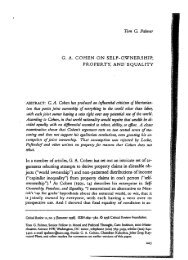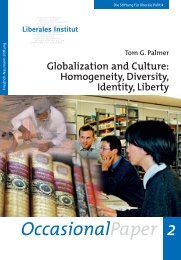Are Patents and Copyrights Morally Justified? - Tom G. Palmer
Are Patents and Copyrights Morally Justified? - Tom G. Palmer
Are Patents and Copyrights Morally Justified? - Tom G. Palmer
Create successful ePaper yourself
Turn your PDF publications into a flip-book with our unique Google optimized e-Paper software.
No. 3] <strong>Are</strong> <strong>Patents</strong> <strong>and</strong> <strong>Copyrights</strong> <strong>Morally</strong>Jvs4fied? 883<br />
Locke sees this right of self-ownership as necessary for liberty.<br />
He explicitly rules out “voluntary slavery” (or absolutism<br />
along Hobbesian lines) <strong>and</strong> takes care to argue that our selfownership<br />
is inalienable. 58 Indeed, the preface of Two Treatises,<br />
in which he states that he hopes that his words “are sufficient to<br />
establish the Throne ofour Great Restorer, Our present King<br />
William; to make good his Title, in the Consent of the People,<br />
which being the only one of all lawful Governments, he has<br />
more fully <strong>and</strong> clearly than any Prince in Christendom,” 59 indicates<br />
that the arguments are intended to overthrow Stuart despotism<br />
<strong>and</strong> usher in an era of liberty. (Remarkably, one of the<br />
principal popular complaints against the Stuarts was their patent<br />
policy.) 60<br />
Ownership in ourselves is the foundation for ownership of<br />
alienable objects because they become assimilated to our bodies.<br />
6 ’ At a highly strategic point in his argument~Locke raises<br />
the following problem:<br />
He that is nourished by the Acorns he pickt up under an<br />
Oak, or the Apples he gathered from the Trees in the Wood,<br />
has certainly appropriated them to himself. No Body can<br />
deny but the nourishment is his. I ask then, When did they<br />
begin to be his? When he digested? Or when he eat? Or<br />
when he boiled? Or when he brought them home? Or when<br />
he pickt them up? 62<br />
Clearly, to force aman to disgorge his meal after he has eaten it<br />
would be to infringe his rights to his own body. But at what<br />
point does it become so intimately related to him, “so his, [that<br />
is], a part of him, that another can no longer have any right to<br />
it,” 63 that to take it from him would be an injustice? Locke setties<br />
on the transformation of the object through labor as the<br />
demarcation point: “And ‘tis plain, if the first gathering made<br />
them not his, nothing else could. That labour put a distinction<br />
between them <strong>and</strong> common. That added something to them<br />
more than Nature, the common Mother of all, had done; <strong>and</strong> so<br />
Id. at 328.<br />
58. Id. at 325.<br />
59. Id. at 171.<br />
60. See C. MACLEOD. INVENTING THE INDUSTRIAL REVOurrIoN: THE ENGLISH PArENr<br />
SYSTEM, 1660.1800 (1988).<br />
61. See Wheeler, Natural Property Rights as Body Rights, 14 Nous 171 (1980).<br />
62. J. LOCKE, supra note 42, at 329-30.<br />
63. Id. at 328.











